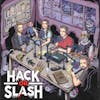No matter what you tell yourself, we all love a good scare. A reminder that safe may not be so safe. That the things which bring us comfort can easily turn against us. That the things we dismiss — movement spotted from the corner of our eye — might be more than a trick of the light.
What a thrill, to walk along the edge of danger without consequence. To dance with monsters and ghosts, the dark things that lurk in places we may only find in our dreams.
Above all else, horror reminds us that we are alive.
The greatest masters of the genre could tell you similar things. Clive Barker will insist the control you believe you have is an illusion. Some of the best horror will tear that control away. In earnest.
But what makes good horror? It’s a subject for debate, naturally. One person’s fear is another’s pleasure.
This podcast explores how we all process the genre differently, as our collected life experiences will have an impact on what each of us perceive as “horror.”
I know too many people who haven’t flinched while sitting through a slasher film. I know a few who refuse to watch a minute of a run-of-the-mill haunting. Even more who are dismissive of a classic monster flick.
And yet, while we could try to unpack the complexity of the human condition, and what truly shapes the horrors that haunt us in our more private moments, we look to horror for the same reasons.
It’s not so different when we’re drawn to other genres. Fantasy offers escape, stepping through a wardrobe that is a doorway to another realm. Science fiction dares us to dream, to reach for the stars and imagine more.
But horror? It only asks us to be brave.
The way we revisit films for nostalgia and comfort extends to horror as well. It may be something we’ve seen countless times, but knowing what happens next maintains that little bubble of safety we need in times of stress. When my anxiety is reaching its peak, I’ll search for something new that carries the promise of fresh terror. It always delivers.
Studies in medicine have explored the impact of horror on the brain — the surge in chemistry can relieve feelings of dread. It’s a primal necessity, considering the list of things we fear today is significantly different from a time when we weren’t at the top of the food chain.
For some, horror isn’t just a cheap thrill. Stephen King once noted that we make up horrors to cope with the real ones. How we process grief, for example, has been the subject of some iconic films. From Don’t Look Now (1973) to the more recent Hereditary, we watch others grapple with loss that takes shape in ways we couldn’t imagine — or might be too familiar with.
Alternatively, horror shoves us out of our comfort zones. Perverts the things we hold sacred. Takes ordinary things and makes them lethal — for a lot of people, Final Destination completely ruined kitchen appliances and the idea of driving behind a truck carrying logs.
We look to horror most often when it reflects the state of the world. A pandemic? Streaming services saw a significant demand for zombie content, whether it was a George Romero cult classic or the staggering fast pace of Train to Busan or World War Z. Jordan Peele’s Get Out won critical acclaim and the praise of audiences because it chose to look directly into the horror of racism. The TV series Lovecraft Country begged the question in each episode: “What’s worse, monsters or white supremacy?” Hint: it was always the latter — by leaps and bounds.
When something is too difficult to face head on, horror offers solace. Solution. Truth. We should never look away, no matter what our instincts tell us. Without suggesting we should all charge headlong into the abyss when it stares back at us, we can instead proceed with caution. Prepared. Ready to overcome the next thing lurking around the corner.
Why does the horror genre exist?
It keeps us human. And if we’re brave enough, it can make us better.


